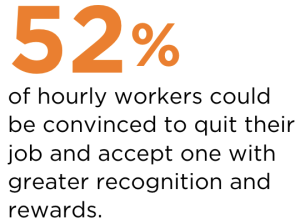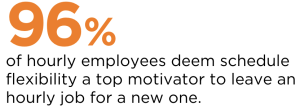The Covid-19 pandemic that so dramatically changed so many people’s lives might well be officially “over” (according to the US government), but the disease is far from going away. In fact it now approaches an endemic state, joining the ranks of other common annual ailments like the flu.
But, as cases of a new strain have surged since the end of the summer, this is absolutely not the time to become complacent.
Covid-19: Cases are rising:
-
There were 18,139 hospitalisations from Covid-19 between 24th-30th September
-
The week ending August 26, there were just over 17,400 people hospitalized with Covid-19, up nearly 16% from the previous week
-
The week ending Aug. 19 saw 2.3% of ER visits with a Covid-19 diagnosis, up from 0.5% the week ending July 1
The recent surge has created unique challenges for workers in high-contact service industries such as retail and hospitality.
Lauded as ‘essential’ during the height of the pandemic, these employees remain unsatisfied with their working conditions – despite many having received an increase in wages.
What business leaders must realize is that pay is far from the only factor influencing the hourly worker experience.
As Legion found in our annual State of the Hourly Workforce Report, 45% of hourly workers consider their jobs undesirable due to poor working conditions.
This should be a wake-up call for business leaders: the hourly employee experience must change. Otherwise, their employees will go elsewhere.
Poor experiences continue to dominate

At a time when hourly staff are at greater risk from Covid-19 than the majority of workers, our survey also found that 62% of hourly workers plan to leave their jobs in the next year, with 67% planning to leave their industry altogether.
A mass exodus of these vital workers could have a devastating ripple effect on the economy.
Fortunately, a combination of employee-forward policies and modern workplace technology can vastly improve the hourly worker experience.
Benefits and flexibility



When Legion asked hourly workers what factors made their jobs the most undesirable, their answers largely pointed to things employers have the power to change.
Nearly half (48%) of the hourly employees we surveyed said they don’t have enough benefits, while 44% said they do not have enough schedule flexibility.
The benefits quotient will vary as employees have different needs (and employers have different budgets), but one benefit emerging as a baseline is earned wage access (EWA).
By providing employees with instant access to their pay, employers can ease financial burdens and make it easier for employees to handle day-to-day expenses.
Other employers are introducing unique benefits to make the workplace more desirable for their hourly workforce, such as tuition reimbursement, mental health benefits and additional career development – all of which can shape a better employee experience to improve morale.
The solution for schedule flexibility can easily be met with an effective workforce management (WFM) platform that delivers intelligent automation to easily and efficiently create schedules that match employee skills and schedule preferences with business needs. This will ensure that workers have more power over their workday – and, therefore, their lives.

Schedule flexibility can also help to mitigate health risks in the workplace. Should employees have to call out sick, managers can use AI-powered WFM solutions to quickly find someone to fill the shift – so reducing the risk of understaffing, and also reducing the risk of that employee infecting their coworkers and customers.
Reduce risks, increase rewards
Service industries carry certain, immutable risks inherent to being customer-facing, but that doesn’t mean employees should feel their working conditions are unsafe or undesirable.
As a result, labor compliance has never been more important.
Employers should lean on workforce management programs that deliver intelligent automation to remain compliant, ensuring employees receive proper rest periods and time off between shifts.
Being able to automate compliance aligned with state and local labor laws will give managers the peace of mind that they’re making decisions to remain compliant.
At the same time, employees should be rewarded for maintaining a safe workplace.
A robust employee rewards program will make the workplace more desirable in general, but it can be especially effective in reinforcing behaviors that make the work environment safer and more positive.
To this end, it’s important to make sure that employees can easily be notified of and access their rewards, such as through automated notifications via a mobile app.
Make employee safety a core value
In the end, hourly workers want to feel respected and valued, and that starts with valuing their safety and well-being in the physical workplace.
When employees come to work, they want to trust that their employer cares about them at all times – especially if they work in a high-contact environment, such as a retail store or restaurant.
Safety should be ingrained in your company’s culture and reinforced through a workforce management platform that delivers intelligent automation to provide both schedule flexibility and employee recognition.
Regardless of the rise in Covid-19 cases, the well-being of your most valuable workers must always be top-of-mind.
With this in practice, we can transform hourly jobs into desirable jobs.
